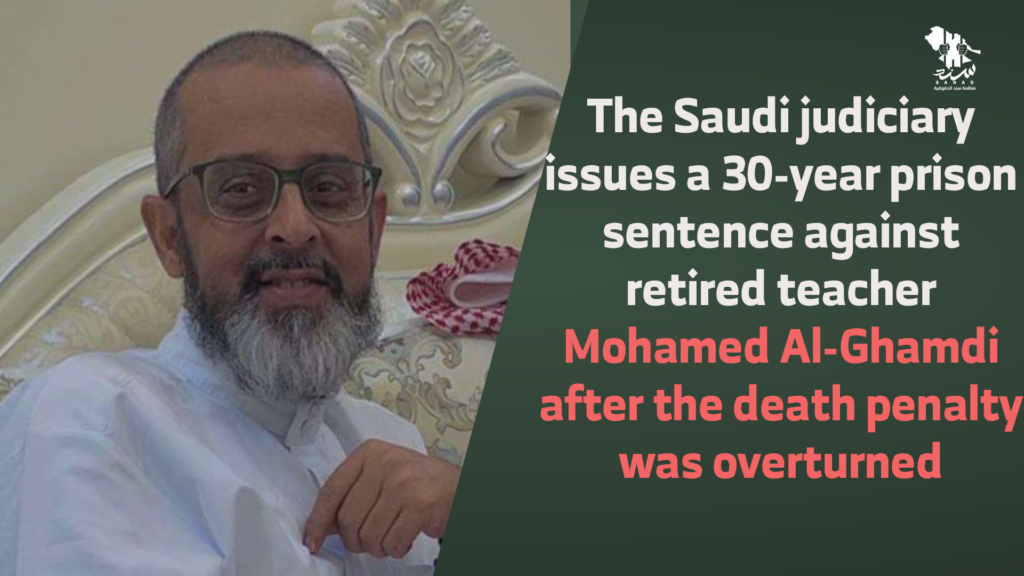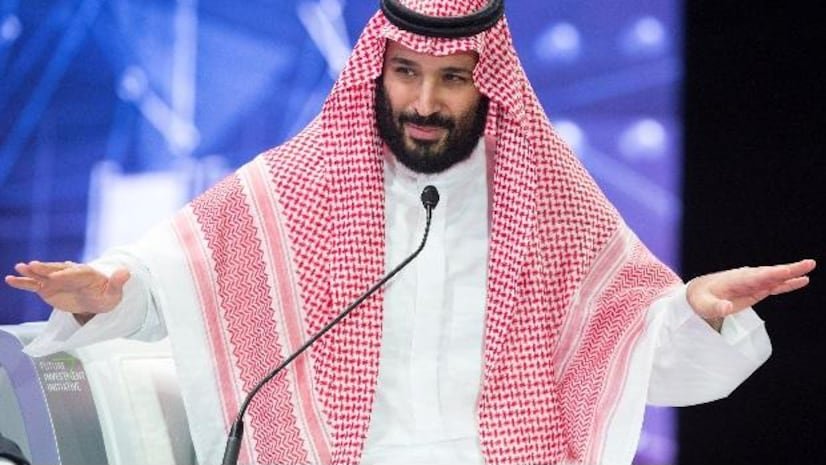
A Saudi court has handed down a 30-year prison sentence to a retired teacher, Mohammad al-Ghamdi, for criticizing the government on social media.
This harsh verdict comes after his initial death sentence was overturned on appeal in August. Al-Ghamdi’s case is a stark example of Saudi Arabia’s escalating crackdown on dissenting voices online.
Retired Saudi teacher has been sentenced to 30 years in prison for criticizing the government on social media, just two months after his death sentence was overturned, according to his brother.
The Charges
Al-Ghamdi was accused of conspiracy against the Saudi leadership, undermining state institutions, and supporting terrorist ideology, despite having only nine followers on his social media account.
His “crimes” included posting criticisms of the government and expressing support for jailed religious clerics.
Mohammed al-Ghamdi, a middle-aged individual, was taken into custody in June 2022. The Specialised Criminal Court, initially designed to handle terrorism cases, oversaw his case.
Al-Ghamdi faced charges stemming from social media posts criticizing the government and expressing solidarity with imprisoned human rights advocates, including prominent clerics Salman al-Awda and Awad al-Qarni.
Notably, al-Ghamdi’s online presence was minimal, with only nine followers on his X (formerly Twitter) account when his legal issues began, as reported by the Gulf Centre for Human Rights. This highlights the Saudi authorities’ extreme sensitivity to even minor forms of dissent.
The Alarming Crackdown on Free Speech in Saudi Arabia: A Case of Repression
The recent death sentence handed down to Mohammed al-Ghamdi, a retired teacher convicted of criticizing the Saudi government on social media, has sparked widespread concern and outrage.
This harsh verdict is a stark reminder of the kingdom’s escalating crackdown on free expression and peaceful dissent.
Crown Prince Mohammed bin Salman’s subsequent expression of regret over the case, stating that the government was “ashamed” of the outcome and hoped for a change in the ruling, offers little solace.
The damage has already been done, and the message is clear: dissent will not be tolerated.
Al-Ghamdi’s conviction was based solely on his online activities, including tweets and YouTube posts deemed critical of the Saudi royal family. This sets a chilling precedent, demonstrating the kingdom’s willingness to silence even the most benign forms of criticism.
Saudi Arabia’s human rights record has long been a subject of concern. The kingdom’s repressive policies have led to the imprisonment of numerous activists, journalists, and intellectuals, simply for exercising their right to free speech. The al-Ghamdi case is merely the latest example of this disturbing trend.
The international community has condemned the sentence, with human rights organizations like Human Rights Watch and Amnesty International labeling it a “horrifying escalation” of Saudi Arabia’s brutal suppression of criticism.
The implications of this crackdown extend far beyond Saudi Arabia’s borders. It sends a troubling message to the world: that dissent will be met with severe punishment, and that freedom of expression is a luxury afforded only to those who toe the line.
As the international community, it is our responsibility to hold Saudi Arabia accountable for its actions. We must demand the immediate release of al-Ghamdi and others imprisoned for exercising their right to free speech.
The time for empty words and hollow promises is over. Concrete action is needed to address the systemic repression plaguing Saudi Arabia. Only through collective pressure and unwavering support for human rights can we hope to create a world where freedom of expression is truly valued.
A Broader Pattern of Repression
This sentence is part of a larger trend of Saudi authorities silencing critics through vague counterterrorism and anti-cybercrime laws.
Amnesty International has documented numerous cases of individuals receiving lengthy prison terms for peaceful online activities, including a Saudi woman who received the longest known sentence for online expression
Saudi Authorities Remain Unresponsive Amidst Growing Concerns
Efforts to solicit a response from Saudi officials regarding Mohammed al-Ghamdi’s case have yielded no results. Meanwhile, another alarming incident has come to light, involving Asaad al-Ghamdi, Mohammed’s brother.
Asaad, 47, received a 20-year prison sentence for comparable social media posts, sparking further outrage. The status of his sentence remains uncertain, with no indication whether it will be revisited.
These cases raise pressing questions about:
1. Freedom of expression in Saudi Arabia
2. The kingdom’s human rights record
3. The arbitrary application of justice
4. The fate of other dissidents facing similar charges
The international community continues to demand transparency and accountability from Saudi authorities.
Saudi Arabia’s ambitious Vision 2030 plan, spearheaded by Crown Prince Mohammed bin Salman, aims to transform the kingdom into a global hub for tourism and business.

However, this push for modernization is overshadowed by the country’s checkered human rights record, particularly when it comes to freedom of speech. The kingdom’s efforts to diversify its economy and attract international investment are undermined by reports of human rights abuses, including the suppression of dissenting voices and the mistreatment of minority groups.
Critics argue that the Saudi government’s attempts to silence critics and restrict freedom of expression are at odds with its claims of modernization and progress. The targeting of activists, journalists, and intellectuals who speak out against the government has raised concerns about the kingdom’s commitment to human rights.
Furthermore, the country’s track record on torture, forced disappearances, and sectarian discrimination is alarming ².Despite these challenges, Saudi Arabia is pushing forward with its economic transformation plans, investing heavily in industries like gaming, sports, and entertainment.
The kingdom’s Public Investment Fund (PIF) has made significant investments in gaming companies, including Nintendo, Take-Two, and EA, with the goal of establishing Saudi Arabia as a gaming powerhouse. However, the international community remains skeptical about the kingdom’s intentions, questioning whether these investments are merely a attempt to “sportswash” or “gameswash” its human rights record.


